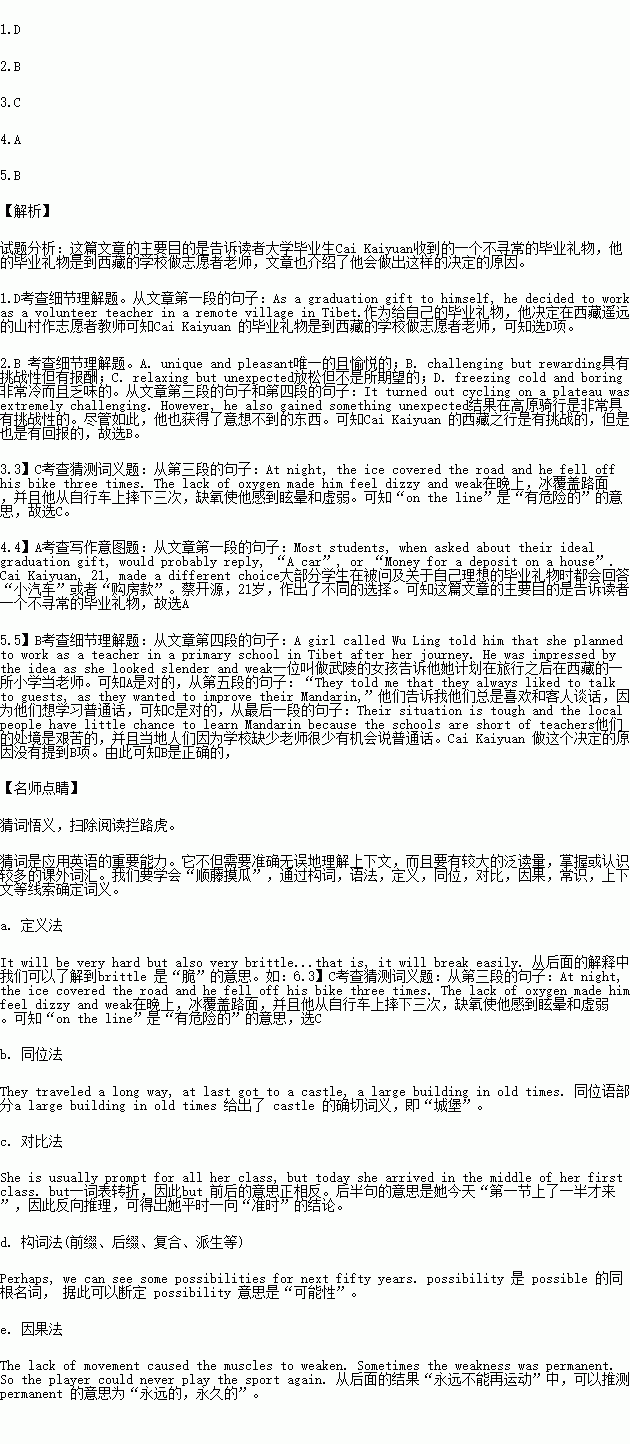题目内容
Most students, when asked about their ideal graduation gift, would probably reply, “A car”, or “Money for a deposit on a house”. Cai Kaiyuan, 21, made a different choice. As a graduation gift to himself, he decided to work as a volunteer teacher in a remote village in Tibet.
Cai, a senior majoring in electrical engineering at Huan Railway Professional Technology College, originally planned to cycle from Sichuan to Tibet. During his journey, Cai’s idea for a different graduation gift to himself began to take shape. “I did not know beforehand what the journey would mean to me. I just want to gain a unique experience and have pleasure in appreciating the view there,” he said.
It turned out cycling on a plateau (高原) was extremely challenging. And it has kept changing his outlook on life. Cai’s fingers even became frostbitten while cycling up a 5008-meter-high mountain, where temperatures often dropped to 18 below zero. At night, the ice covered the road and he fell off his bike three times. The lack of oxygen made him feel dizzy and weak. “At the most serious moment, I felt that my life was on the line,” said Cai.
However, he also gained something unexpected. At Ya’an, a city in Sichuan, he met a group of tourists who are also university students. A girl called Wu Ling told him that she planned to work as a teacher in a primary school in Tibet after her journey. He was impressed by the idea as she looked slender and weak.
It was not until he reached a family-run hotel in Shigatse that Cai’s spirits began to rise. The hotel manager’s two daughters enjoyed talking with him. The kids asked about his experiences on his trip, and showed him the beautiful local lakes. “They told me that they always liked to talk to guests, as they wanted to improve their Mandarin,” he said, “Their parents and many locals can only speak Tibetan.”
Cai was touched by the girls’ story. Their situation is tough and the local people have little chance to learn Mandarin because the schools are short of teachers. “I want to do something to improve the situation for kids like them,” said Cai. His parents finally gave their agreement and his teachers also supported him.
1.According to the passage, Cai Kaiyuan’s graduation gift to himself is _________.
A. to have money for a deposit on a house
B. to travel by cycling from Sichuan to Tibet
C. to own a new car and marry a slender girl
D. to work as a volunteer teacher in Tibetan school
2.What words can be used to describe Cai’s journey to Tibet?
A. unique and pleasant
B. challenging but rewarding
C. relaxing but unexpected
D. freezing cold and boring
3.The underlined phrase “on the line” in the third paragraph means “ ____________”.
A. in a dilemma(进退两难)
B. making a phone call
C. at risk
D. very painful
4.The purpose of writing this passage is to ____________.
A. tell us about an unusual graduation gift
B. introduce a dangerous journey to us
C. give advice on how to travel to Tibet
D. encourage us to be a teacher in Tibet
5.Which of the followings is NOT the reason for Cai to make his decision?
A. He met Wu Ling and was impressed by her plan.
B. His parents and teachers persuaded him to go to Tibet.
C. He was moved by the kid’s desire to improve their Mandarin.
D. A lack of teachers makes the local people have little chance to learn.
 课课优能力培优100分系列答案
课课优能力培优100分系列答案 优百分课时互动系列答案
优百分课时互动系列答案Suppose you want to go abroad and learn about the foreign exchange in culture in different countries. Here is some information you may need.
Name:Susan Lane Age:22 Place:Reykjavik, Iceland, 1994. Cost:$7,000 Organization:AFS Experience:“I think it was a turning point in my life. I began to understand more about my own culture by experiencing another culture and seeing how other people live.” |
Name:Sara Small Age:23 Place:Crivitz, Germany, 1996. Cost:$8,000 Organization:EF Foundation Experience:“I love the traveling and I made a lot of friends. I found the European school system to be hard but I am fluent now in German so it was worth it. I did miss my family and friends in Australia but I would love to do it again.” |
Name:David Links Age:16 Place:Stuttgart, Germany, 1996. Cost:$4,500 Organization:Southern Cross Cultural Exchange Experience:“I wanted to try something that was very different in culture. In Germany everything was different but I soon got settled. The family I was with was great and I really feel as though I have a second family.” |
Name:Tom Jennings Age:21 Place:Conflans, France, 1995. Cost:$7,000 Organization:Southern Cross Cultural Exchange Experience:“There were times when it was difficult but I liked it, experiencing a different culture. You just have to adapt to each situation as it comes. If there is one thing you learn when you are on a student-exchange program it is how to take care of yourself.” |
Name:Linda Marks Age:19 Place:Chonburi Province, Thailand, 1994. Cost:$3,500 Organization:Rotary International Experience:“There are lots of ups and downs, but you always come back for more. I had a few problems but there was always someone to turn to and that was great.” |
1.According to the information, taking part in a foreign exchange program can cost ________.
A. from $4,500 to $8,000 B. from $3,500 to $8,000
C. anything from $3,500 D. no more than $7,000
2.The students who refer to both the good and bad times as an exchange student include ________.
A. Susan Lane and Sara Small
B. Linda Marks and David Links
C. Tom Jennings and Linda Marks
D. Susan Lane and Tom Jennings
3.As a result of his experience in the foreign exchange program Tom Jennings learnt to become _________.
A. independent and adaptable
B. determined and independent
C. selfish and defensive
D. defensive and determined
4.If a student wanted to take part in a foreign exchange program, but had not enough money, then the best place would be ________.
A. Iceland and America B. Thailand and France
C. Germany and Iceland D. Germany and Thailand

